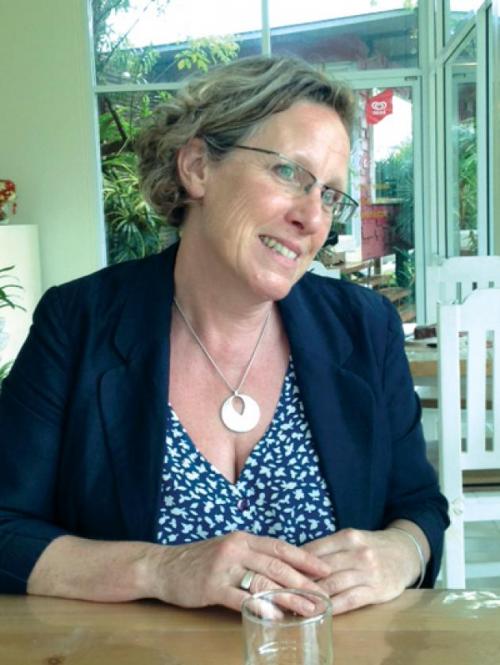Phuket Gazette Thailand News: Corruption hits new high; Brit mum campaigns for road safety; Abhisit to face more 2010 murder charges

– Thailand news compiled by Gazette editors for Phuket’s international community
PHUKET: With bribes hitting 30-50 per cent of project prices, and the public showing signs of becoming inured to the practice, corruption has reached a critical point, the Thailand Development Research Institute (TDRI) says.
“Back in 1997, people used to react strongly when we found that bribes were 10-18 per cent [of project costs],” Deunden Nikomborirak from the TDRI said yesterday.
“Back then, they felt it was a very high percentage,” she told a seminar held by Phuket Gazette affiliate Krungthep Turakij TV’s Business Talk programme.
However, people hardly react to recent research that found graft had grown much worse, she said.
Thais may have already become used to corruption now, she said.
However, she was not losing hope. When the situation becomes too serious, those who are affected would join forces and take action.
“That’s how an effective anti-corruption movement developed in Hong Kong,” she said.
“People are the only hope because law enforcers are not entirely free from political influence.”
People unaffected by corruption should also speak out against it.
“Let’s demand righteousness for society,” she said.
The seminar on “An Anti-Corruption Strategy by the Private Sector” was aimed at brainstorming ideas and following up on the progress against corruption.
Pramon Sutivong, chairman of the Anti-Corruption Network, said the public had become more aware of the social disease but it would take more time to see tangible results. “We hope that more and more people will join us in preventing corruption,” he said.
The network plans to stage an anti-corruption rally on May 19 at Thammasat University to raise the younger generation’s awareness of corruption problems.
“We hope people will decide to not work with the corrupt,” he said.
The network would also monitor the government’s Bt2.2 trillion public infrastructure plan, Bt350 billion water management and flood prevention plan, and the rice-pledging scheme.
Vorawan Tarapoom, CEO of BBL Asset Management, says that out of 176 countries, Thailand ranked 88th in the latest Corruption Perceptions Index.
“Out of a possible score of 100 for transparency, Thailand had just 37. This is on par with Zambia, Swaziland and Malawi,” she said.
In comparison, Singapore got an 87, she said.
The company was planning to persuade organisations to introduce more solid measures against irregularities.
“We may pass a resolution to not support any lending to corrupt companies,” she said.
The media should take a more proactive role in cracking down on fraud, she added.
Prateep Tangmatitham, vice president of the Thai Listed Companies Association, told the seminar that anti-corruption efforts in the private sector would succeed if high-level executives had good intentions and laid down good policies.
“For example, they should develop clear rules on the acceptance and scope of gifts. All organisations should also have an independent panel to investigate suspicious cases,” he said.
Banyong Pongpanich, CEO of Kiatnakin Bank, said the government should do more outsourcing of services. “Many pay bribes because they want convenience in contacting authorities and receiving services,” he said.
A survey showed that 70 per cent of companies have paid bribes in exchange for convenience, and 80 per cent of them said the money was worth it, he said.
“Outsourcing can improve the delivery of services by government agencies. That’s why many foreign governments have already used outsourcing. When private enterprises can receive services conveniently, they won’t resort to bribe paying,” he said.
Instilling the right attitude and proper values would go a long way, so Thais must be taught two things. “They must not cheat and they must not allow themselves to be cheated.”
PHUKET: A British woman is taking part in a campaign to raise awareness in the United Kingdom about the risks of travelling in Thailand after losing her teenage son in a road accident here three years ago due to the lack of safety features on a bus he travelled on.
Rachel Robinson has called on Britons to exercise caution when travelling in Thailand, saying a large number of tourists from the UK are killed in road accidents here every year.
World Health Organisation (WHO) statistics reveal a high road casualty rate in Thailand – 39.1 per 100,000 people in 2011, which was the highest in Southeast Asia and third highest in the world. But Robinson and the WHO report did not have data on how many people from the UK were killed in accidents in Thailand in recent years.
Felix Robinson, 19, was killed when a bus he was travelling in collided with another vehicle in Ranong’s Kra Buri district on May 11, 2010. He was about to study economics at Manchester University in September that year. The young man, the sole fatality in that crash while many other passengers were injured, was an adept musician who taught music for free to Thai children living in the North.
Robinson said there were no seat belts on the bus her son was on, and little tread on the tyres. She said many seats were unstable and the speedometer showed that the vehicle was travelling in excess of the legal limit before the collision. A Brighton-based coroner, Veronica Hamilton-Deeley, said later that the collision was “entirely avoidable”.
The mother said her family was promoting awareness over poor safety features associated with public transport in Thailand as well as pursuing legal action against the company that operated the bus and the driver who fled the scene.
At a trial on April 29, which Robinson attended, the unnamed driver pleaded guilty – after hiding for two years. She said her family was considering filing a civil lawsuit against the unnamed company, but was still compiling evidence against the owners and bus managers, who discontinued the operation and opened a new company to continue operating the service.
She said she planned to meet with the Land Transportation Division and its local office in Ranong to query why the bus, which had recently passed an inspection, had worn-out tyres without tread on them.
With Thailand being a fast-developing country, she felt road casualties could be easily reduced through safety measures that should be adopted through strict and transparent enforcement by motor vehicle authorities. “Drivers should be trained and tested frequently, and safety belts and other safety features should be prime requirements for granting a concession,” she said.
PHUKET: Democrat Party leader Abhisit Vejjajiva and his party MP Suthep Thaugsuban are likely to face additional murder and attempted murder charges in connection with deaths and injuries sustained by red-shirt protesters during the political unrest in April and May 2010.
On May 14, the Department of Special Investigation will summon the former PM Abhisit and his then-deputy Suthep, who was in charge
— Phuket Gazette Editors
Latest Thailand News
Follow The Thaiger on Google News:


























